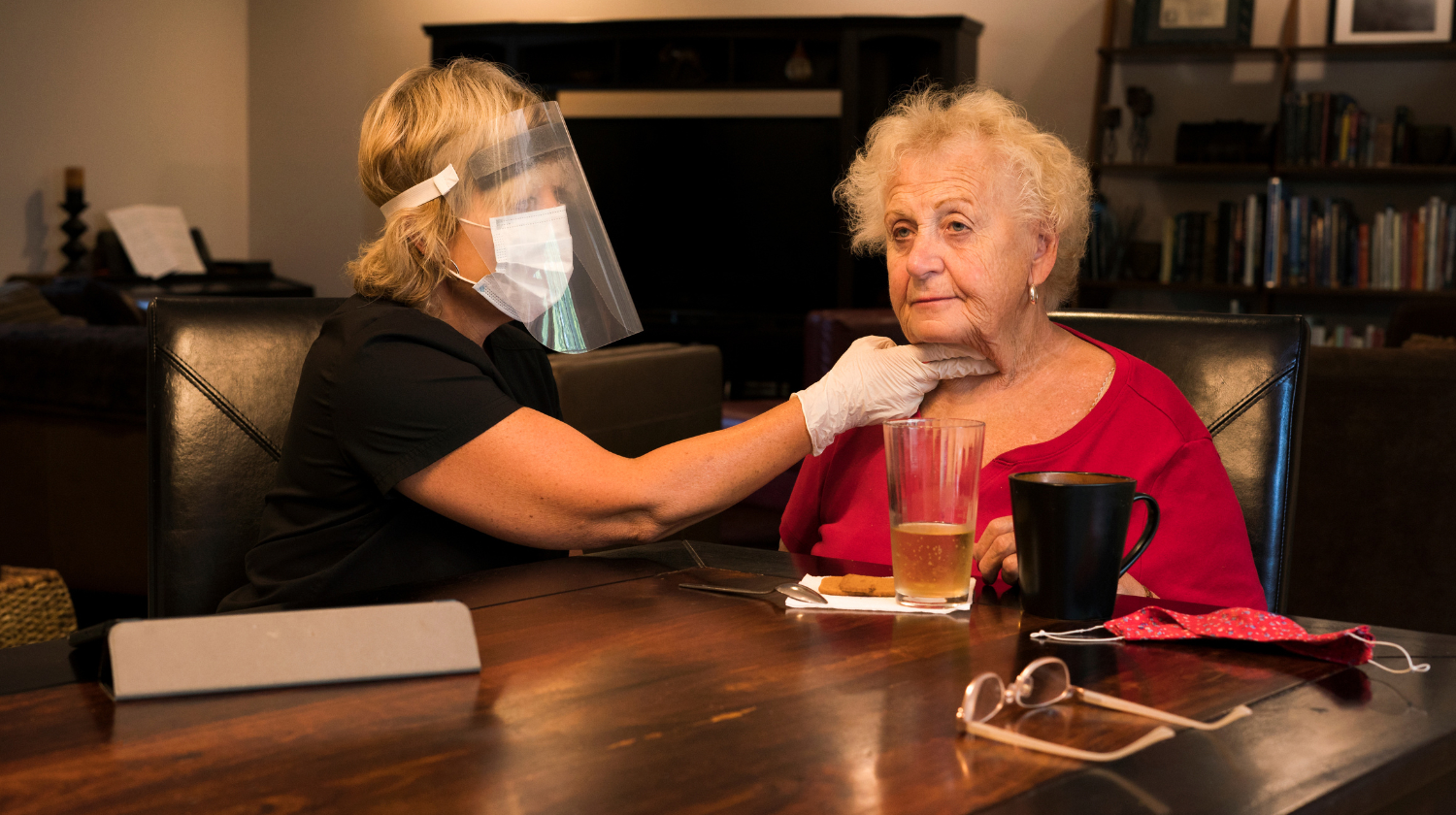 Expert's opinion
Expert's opinion
Expert's opinion
The article is a subjective view on this topic written by writers specializing in medical writing.
It may reflect on a personal journey surrounding struggles with an illness or medical condition, involve product comparisons, diet considerations, or other health-related opinions.
Although the view is entirely that of the writer, it is based on academic experiences and scientific research they have conducted; it is fact-checked by a team of degreed medical experts, and validated by sources attached to the article.
The numbers in parenthesis (1,2,3) will take you to clickable links to related scientific papers.
How To Overcome Swallowing Anxiety – 7 Ways To Try 2024

Do you know that some people experience swallowing problems due to anxiety? It feels like you’ve forgotten how to swallow when such episodes occur. You may find it difficult to breathe or talk, and you might choke on the foods or beverages you consume. This can be a dangerous and uncomfortable way to live.
Such scenarios happen when your throat muscles tighten, causing swallowing anxiety. The symptoms accompanying problems swallowing can include dry mouth, rapid heart rate, and sometimes choking. The cause of swallowing anxiety can be a side effect of extreme anxiety or digestive tract issues like gastroesophageal reflux disease.
Here we will look at seven anxiety treatments that can help you eliminate overwhelming swallowing anxiety. Read on to learn how to overcome swallowing for safer and healthy eating.
7 Useful Ways To Overcome Swallowing Anxiety
- Cognitive behavioral therapy.
- Deep breathing and relaxation techniques.
- Exposure therapy.
- Prescribed medication.
- Professional help from a mental health provider.
- Self-help strategies.
- Practicing swallowing exercises.
What Is Swallowing Anxiety?
Swallowing anxiety, also known as phagophobia,[1] is a type of anxiety disorder characterized by a fear of choking. It is often associated with trouble swallowing or dysphagia, which can lead to physical and psychological symptoms.
Common anxiety symptoms such as the fight or flight response, rapid heartbeat, panic attacks, dry mouth, and a choking sensation may also be present if you have swallowing anxiety.
Other related conditions, such as Globus sensation, acid reflux, and stomach pain, may contribute to swallowing anxiety. Those who experience Globus sensations[2] typically feel a tightness in their throat unrelated to eating. Acid reflux[3] occurs when stomach acid flows back into the esophagus, causing heartburn and discomfort and contributing to swallowing anxiety.
Acid reflux is a recurring issue that may cause further anxious feelings and thoughts related to swallowing if left unattended. As a result, you may avoid eating, missing out on essential nutrients in your diet.
Over time, these anxiety attacks can snowball, leading to increased stress and avoidance behaviors. Some people may struggle to work properly, engage in daily life, and enjoy eating or drinking.
Fortunately, many self-help strategies and professional treatments are available to overcome swallowing anxiety.
Causes Of Swallowing Anxiety
Swallowing anxiety is a complex condition influenced by various factors, which can vary from person to person. Your doctor or speech-language pathologist can offer professional help in diagnosing and treating swallowing anxiety.
Common factors that can contribute to phagophobia include:
- A previous negative experience with swallowing, such as choking or gagging.
- Generalized anxiety or panic disorders.
- Medical conditions that affect the throat muscles or esophagus include nerve damage to the head and neck, esophageal spasms, and Parkinson’s disease.[4]
- A spike in stress hormones.
- Certain medications.
- Fear of choking or being unable to breathe.
Understanding your anxiety’s underlying causes and triggers can be important in managing and overcoming your symptoms. You must seek professional help from a healthcare professional to receive proper medical care.
How To Deal With Swallowing Anxiety
If you’re living with swallowing anxiety, you can rely on several strategies to help you manage your symptoms. These include:
Cognitive Behavioral Therapy

Cognitive behavioral therapy helps people change their negative thought patterns and behaviors. It can help you develop healthier ways of thinking and behaving. It can treat anxiety disorders and effectively help you deal with swallowing anxiety.[5]
CBT can help you swallow food safely by identifying and challenging negative or anxious thoughts. Your CBT therapist may also teach you coping skills and help address underlying anxiety issues to reduce further implications.
Deep Breathing And Relaxation Techniques

Deep breathing exercises and other relaxation techniques can help calm the autonomic nervous system[6] and reduce anxiety symptoms. Techniques like diaphragmatic breathing, progressive muscle relaxation, and visualization can help you manage your swallowing anxiety symptoms.
You might also rely on diaphragmatic breathing,[7] which involves deep, slow breaths to help calm the body and reduce tension. Progressive muscle relaxation[8] involves tensing and relaxing different muscle groups to release physical tension.
Conversely, visualization involves imagining positive outcomes and can help you feel more confident about swallowing. You can practice these techniques at home, work, or in public to reduce anxiety and improve overall mental health.
Exposure Therapy

Exposure therapy[9] involves gradually exposing a person to their feared object or situation in a controlled environment. If you feel anxious during feeding, an exposure therapist may gradually expose you to foods that trigger your fear of choking.
Of course, it’s important to remember that exposure therapy is best done under the guidance of a trained mental health professional.
Prescribed Medication

An ear, nose, and throat doctor might also prescribe medications to help manage your symptoms of swallowing anxiety. These may include anti-anxiety or antidepressant medications.
To mitigate any adverse side effects, speak with your healthcare provider about the potential risks and benefits of taking medication for swallowing anxiety.
Professional Help

Professional help from a dedicated mental health provider can be an influential resource in managing your swallowing anxiety.
A mental health professional can help you identify the underlying causes of anxiety and develop a treatment plan tailored to your needs. They can provide you with tools to overcome your fear of swallowing pills, food, and drinks.
Self-Help Strategies

In addition to professional treatment, you can incorporate self-help strategies to overcome and deal with swallowing anxiety. Mindfulness meditation, creative hobbies, and other stress-reducing activities can help you manage your anxiety symptoms.
Some people rely on exercise, while others rely on artistic hobbies. The options are endless. You can do them at home or in public settings, and they can be useful tools for the long-term management of anxiety symptoms.
Swallowing Exercises

Strengthening the throat muscles responsible for swallowing can be an effective strategy to improve your trouble swallowing. Your doctor or speech therapist can recommend exercises to improve your swallowing reflexes and reduce anxiety associated with swallowing.
Exercises that strengthen the neck muscles using resistance include isometric and isokinetic movements.[10] These may strengthen your neck muscles, enhancing your natural reflex. Examples of resistance exercises that your doctor may prescribe are:
- Effortful swallow exercise: Swallow while squeezing the muscles in your throat as hard as possible.
- Jaw opening against resistance: Place a resistance band under your chin and open your mouth against the resistance.
- Chin tuck against resistance: Place a resistance band around the back of your head and tuck your chin down against the resistance.
Other Anxiety Treatments
In addition to the treatments mentioned previously, some people may find alternative options helpful as well. :
- Hypnotherapy:[11] A trained hypnotherapist can help you address the underlying causes of your anxiety through guided relaxation techniques.
- Speech therapy: A speech therapist can work with you using the fibreoptic endoscopic evaluation of swallowing[12] or the FEES test. This test may improve your swallowing function and reduce anxiety around swallowing.
- Biofeedback:[13] This technique uses sensors to monitor muscle tension and help you learn how to control your body’s responses to anxiety.
- Lifestyle changes: Changing your diet,[14] reducing alcohol and caffeine intake, and quitting smoking can help reduce symptoms of acid reflux and improve swallowing function.
- Surgery: In severe cases of acid reflux, surgery may be necessary to correct the issue and alleviate symptoms of swallowing anxiety.
Conclusion
Swallowing anxiety is a complex condition that can significantly affect your day-to-day activities. Thankfully, there are many strategies and treatments available to manage your symptoms. You can overcome anxiety related to swallowing through cognitive behavioral therapy, breathing exercises, medication, self-help techniques, and throat-strengthening exercises.
Even so, it’s essential to consult a healthcare professional to ensure you receive the correct diagnosis and follow the proper treatment plan. And remember, if you have swallowing anxiety, you can conquer it and reclaim control of your life with patience, persistence, and help from your trusted medical provider.
+ 14 sources
Health Canal avoids using tertiary references. We have strict sourcing guidelines and rely on peer-reviewed studies, academic researches from medical associations and institutions. To ensure the accuracy of articles in Health Canal, you can read more about the editorial process here
- Chathurie Suraweera, Raveen Hanwella and Varuni de Silva (2014). Phagophobia: a case report. [online] doi:https://doi.org/10.1186/1756-0500-7-574.
- Manabe, N., Tsutsui, H., Kusunoki, H., Hata, J. and Haruma, K. (2014). Pathophysiology and treatment of patients with globus sensation —from the viewpoint of esophageal motility dysfunction—. [online] 50(0), pp.66–77. doi:https://doi.org/10.1540/jsmr.50.66.
- Clarrett, D.M. and Hachem, C. (2018). Gastroesophageal Reflux Disease (GERD). Missouri medicine, [online] 115(3), pp.214–218. Available at: https://www.ncbi.nlm.nih.gov/pmc/articles/PMC6140167/
- Suttrup, I. and Warnecke, T. (2016). Dysphagia in Parkinson’s Disease. [online] 31(1), pp.24–32. doi:https://doi.org/10.1007/s00455-015-9671-9.
- Etoh, M., Tomoyo Itonaga, Saori Oguri, Kiyota, A. and Ihara, K. (2022). A Seven-Year-Old Girl With Dysphagia Due to Fear of Swallowing: A Favorable Outcome With Cognitive Behavioral Therapy Using an Anxiety Hierarchy Chart. [online] doi:https://doi.org/10.7759/cureus.33196.
- Russo, M., Santarelli, D.M. and O’Rourke, D.M. (2017). The physiological effects of slow breathing in the healthy human. [online] 13(4), pp.298–309. doi:https://doi.org/10.1183/20734735.009817.
- Hopper, S.I., Murray, S.L., Ferrara, L.R. and Singleton, J.K. (2019). Effectiveness of diaphragmatic breathing for reducing physiological and psychological stress in adults. [online] 17(9), pp.1855–1876. doi:https://doi.org/10.11124/jbisrir-2017-003848.
- Toussaint, L., Quang Vinh Nguyen, Roettger, C., Dixon, K., Offenbächer, M., Kohls, N., Hirsch, J.K. and Sirois, F.M. (2021). Effectiveness of Progressive Muscle Relaxation, Deep Breathing, and Guided Imagery in Promoting Psychological and Physiological States of Relaxation. [online] 2021, pp.1–8. doi:https://doi.org/10.1155/2021/5924040.
- Sars, D. and Agnes van Minnen (2015). On the use of exposure therapy in the treatment of anxiety disorders: a survey among cognitive behavioural therapists in the Netherlands. [online] 3(1). doi:https://doi.org/10.1186/s40359-015-0083-2.
- S.A.C. Kraaijenga, van, Stuiver, M.M., H.J. Teertstra, Frans and Remco de Bree (2015). Effects of Strengthening Exercises on Swallowing Musculature and Function in Senior Healthy Subjects: a Prospective Effectiveness and Feasibility Study. [online] 30(4), pp.392–403. doi:https://doi.org/10.1007/s00455-015-9611-8.
- Reid, D.M. (2016). A Case Study of Hypnosis for Phagophobia: It’s No Choking Matter. [online] 58(4), pp.357–367. doi:https://doi.org/10.1080/00029157.2015.1048544.
- Rainer Dziewas, Matthias, Birkmann, U., Götz Bräuer, Busch, K., Cerra, F., Damm-Lunau, R., Dunkel, J., Amelie Fellgiebel, Garms, E., Glahn, J., Hagen, S., Held, S., Helfer, C., Hiller, M., Horn-Schenk, C., Kley, C., Lange, N., Lapa, S. and Ledl, C. (2019). Safety and clinical impact of FEES – results of the FEES-registry. [online] 1(1). doi:https://doi.org/10.1186/s42466-019-0021-5.
- O’Rourke, A. and Humphries, K. (2017). The use of High-Resolution Pharyngeal Manometry as Biofeedback in Dysphagia Therapy. Ear, Nose & Throat Journal, 96(2), pp.56–56. doi:https://doi.org/10.1177/014556131709600205.
- Zhang, M., Hou, Z., Huang, Z., Chen, X. and Liu, F. (2021). Dietary and Lifestyle Factors Related to Gastroesophageal Reflux Disease: A Systematic Review. [online] Volume 17, pp.305–323. doi:https://doi.org/10.2147/tcrm.s296680.



